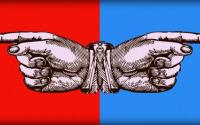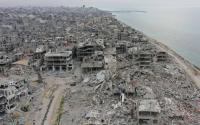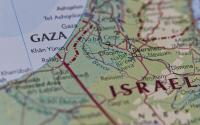April 2003: British soldiers are greeted as liberators as they patrol Iraq's second city. The Parachute Regiment dispenses with hard helmets in favour of red berets as it adopts a softly-softly approach to foster good relations
May 2006: Five British soldiers die as a missile brings down their helicopter. Iraqis celebrate and a firefight kills five more as UK forces rush to the scene. Iraqis continue to be killed in vast numbers throughout the country
A crowd cheers the shooting down of a British military helicopter; petrol bombs set fire to Warrior armoured vehicles; accusations are made that British troops are responsible for civilian deaths, including two children. This is Basra, three years after Iraq's "liberation".
At the end of a week of turmoil for the British Government - John Prescott's humiliation over his adultery, Charles Clarke's departure over the foreign prisoners fiasco, and open rebellion against the Prime Minister - a weekend of violence in Iraq provided a stark reminder of the most serious issue to overshadow the Blair administration.
After five servicemen had been killed in the first British helicopter to be shot down in Iraq, and as a second night of curfew began in Basra, British forces were battening down the hatches at their headquarters in the city.
The tense atmosphere contrasted with the days shortly after the invasion in 2003, when Shia southern Iraq was being held up as a model of reconstruction and a brave new post-Saddam Iraq. The violence over the weekend suggest those days are long over.
A commander of the Mehdi Army, the militia led by the radical Shia cleric Muqtada al-Sadr, claimed that his men had brought down the British helicopter with a Russian-made, shoulder-fired missile launched from a building in the north-western al-Ashaar district of the city. There was, however, no confirmation of this. The Iraqi President, Jalal Talabani, sent a message of condolence over the British deaths.
Troops sent to the scene of the crash became involved in a firefight with Shia gunmen and five Iraqis were killed. The UK authorities said the shots which killed the civilians could have come from insurgents who had also fired mortar rounds. General John Cooper, the commander of the British forces, said troops did not fire directly into the crowd but at targets threatening them.
The debris from the aircraft was being examined to see whether it had been struck by rocket-propelled grenades or missile fire. The army version of the Lynx helicopter has a flight crew of two, a door gunner and can carry a further 10 soldiers. A Ministry of Defence spokesman said all the helicopters were fitted with anti-missile equipment, including flares to deflect heat-seeking devices, and electronic warning and jamming devices. Nevertheless, all but the most essential military flights have now been grounded in southern Iraq. That combined with the severe restrictions imposed on road movements after a series of attacks with sophisticated roadside bombs, allegedly supplied by the Iranians, have left British officials in a state of official "lockdown".
Mayhem continued elsewhere, with car bombs killing 30 people and injuring 70 in Karbala and Baghdad. On the same day 42 bodies, victims of sectarian attacks, were found in the Iraqi capital, many showing signs of being tortured before being killed. According to official figures more than 100,000 people have fled their homes to escape sectarian violence between Shias and Sunnis in the past three months.
There was still no sign of a cabinet due to be formed by Nuri al-Maliki, the Shia Islamist nominated as prime minister two weeks ago after months of stalemate following elections in December.
Des Browne, the new Defence Secretary, said: "This is not an indication of the state of either the city of Basra or the provinces we have responsibility for. Day-on-day, the local forces are coming into control of this area because of the training that we have been able to give them and with our allies." Mr Browne said he was in constant contact with British commanders in Iraq and they had told him that "calm and control had been restored in Basra and that people were going about their ordinary business".
The weekend's scenes, with Iraqis throwing rocks and petrol bombs at British troops and chanting in support of Muqtada al-Sadr and his Mehdi Army were reminiscent of last September when British forces clashed with Iraqi police while rescuing two SAS men from Iraqi detention. The two had been gathering intelligence on Iraqi police officers who were widely suspected of abduction, murders and torture.
British troops smashed down the wall of a police station to rescue the two soldiers and the violence that followed led to the condemnation of Britain by Iraqi Shia political and religious leaders, led by Basra's governor, Mohammed al-Walli, who also said that Iraqi officials would stop co-operating with the British.
Since then attempts have been made to repair relations but these have deteriorated to such an extent that British troops only leave their heavily fortified bases when absolutely necessary.
Three months ago, British forces found a cache of new shoulder-fired, surface-to-air missiles. These too, it is claimed, were supplied by Shia Iran to Iraqi Shia paramilitaries.
The same paramilitaries - the Mehdi Army and its rival Badr Brigade - have heavily infiltrated the Iraqi police. Having been invited to join by the British authorities, they had taken over police stations and unleashed a terror campaign against the Sunni population, as well as those not deemed to be following fundamentalist religious tenets.
The militias are closely allied to Shia political parties now forming the government and have been accused of forming death squads, such as the one that killed the 42 victims found in Baghdad.
In Basra yesterday the mood was one of trepidation. Mohammed Haidar Ali, a 42-year-old engineer, said: "We do not like this violence, we all want peace. But this was aimed at the British, and, as long as they stay, things like this will continue to happen."






